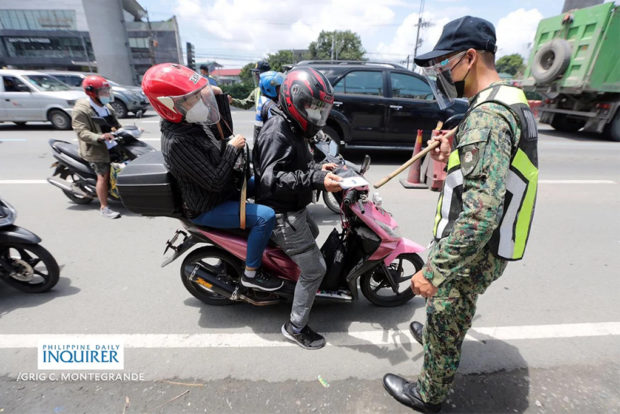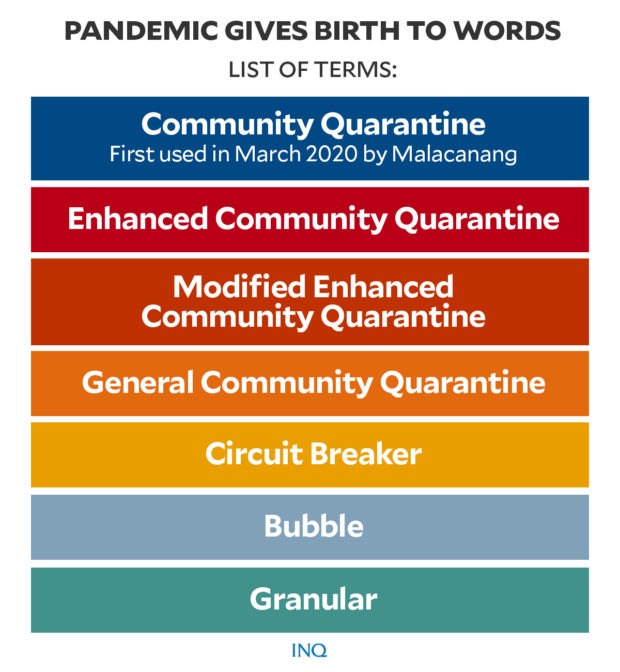Bubble, circuit breaker anyone? The birth of a new COVID lexicon in PH
MANILA, Philippines—For more than 500 days now, the Philippines remained to be on COVID lockdown, probably the longest in the world, with rules being revised with uncanny regularity by President Rodrigo Duterte’s coronavirus task force.
Perhaps one of the most confusing for Filipinos are the quarantine terms used by the national government, which have evolved since lockdown was enforced in March 2020 and mutated much like the virus which the government lexicon hoped to properly address.
A second look at some of the COVID terms that have become part of dialogues on lockdowns and pandemic response would show why many people would consider them perplexing.
What is it again?
In March 2020, when Duterte first implemented a lockdown to contain the spread of SARS Cov2, the virus that causes COVID-19, the national government used the term “community quarantine.”
According to the Inter-Agency Task Force for the Management of Emerging Infectious Diseases (IATF), community quarantine refers to “the restriction of movement within, into, or out of the area of quarantine of individuals, large groups of people, or communities, designed to reduce the likelihood of transmission of an infectious disease among persons in and to persons outside the affected area.”
Article continues after this advertisementREAD: Metro Manila placed under ‘community quarantine’ due to COVID-19
Article continues after this advertisementBut the measures enforced during the quarantine period had all the characteristics of a lockdown. So why not use lockdown instead of quarantine?
The Department of the Interior and Local Government (DILG) explained, as they cautioned the media on choice of words, that the word lockdown might cause fear and panic among the public.
DILG spokesman Jonathan Malaya explained that the word lockdown is used only when people are confined in one area or place and are barred by authorities from leaving.
“That’s why the word lockdown is usually used in relation to prisoners,” Malaya had said in a statement. “So when China declared a lockdown in Wuhan, its citizens are not allowed to leave those cities and the highways were closed. That’s a lockdown,” he said.
Malaya added that the term lockdown can be considered as an “extreme measure” and was not fit to be used at the time since there was “no compelling reason to place any place under lockdown.”
Community quarantine has since given birth to two more terms—enhanced community quarantine (EQC) and general community quarantine (GCQ).
Soon after, two more terms would be born—Modified Enhanced Community Quarantine (MECQ) and Modified General Community Quarantine (MGCQ).
GCQ also had other iterations: GCQ with additional heightened restrictions and GCQ with heightened restrictions.
On Thursday (Aug. 12) INQUIRER columnist Ma. Ceres Doyo wrote that many Filipinos remain confused about the terms being used by the government in its pandemic response.
“Many people still cannot tell the difference between ECQ, MECQ, and GCQ,” Doyo wrote.
“Authorities stuck to them despite suggestions that they use number or color equivalents to signify the severity of the COVID-19 situation and as guide in following safety protocols, like what the weather bureau does,” her column said.
READ: Perpetually perplexed people
More confusing words
Aside from the different versions of community quarantine, several other pandemic terminologies have been born in the past few months.
Last March, the OCTA Research Team—independent polling, research, and consulting firm and a group of experts monitoring the COVID-19 situation in the Philippines—proposed the use of a “circuit breaker” to slow the spread of COVID.
According to a BBC report, a circuit breaker pertains to “a tight set of restrictions designed to reverse the tide of the epidemic and bring the number of cases down.”
Circuit breakers place an area in a tighter lockdown from a loose lockdown following an increase in the number of infections.
However, unlike the community quarantines imposed by the national government, circuit breakers are considered safer as it is implemented for a fixed period of time—usually only two weeks.
“The hope is they are less damaging—to the economy and people’s mental health—than a longer lockdown, because people can plan ahead more easily,” the BBC report read.
The OCTA Research team suggested the implementation of a “hard general community quarantine” (hard GCQ) or a “soft modified enhanced community quarantine” (soft MECQ).
Prof. Ranjit Rye, of OCTA Research, explained that under a hard GCQ, the issuance of quarantine passes will be limited to the workforce only.
Indoor dining in restaurants and attending social gatherings are also discouraged.
In a soft MECQ, malls and groceries can only operate at a limited capacity. OCTA said this measure should be considered if the surge in COVID-19 cases continued after two weeks.
READ: Cases hit new single-day high; tighter curbs urged
Another term that has left many Filipinos confused when it was first used on a resolution issued by the IATF was the “GCQ bubble” or “bubble.”
A bubble, according to the IATF, is an area where entry and exit are restricted— except during emergencies. It aims to prevent infected people from getting in or getting out of an area.
READ: FAQs: What’s a GCQ bubble?
In April, Metro Manila mayors agreed to recommend a “flexible” MECQ in a bid to control the cases of COVID-19.
Metropolitan Manila Development Authority chair Benhur Abalos said that a flexible MECQ is a “middle ground” between MECQ and a looser GCQ, meaning strict border control and health protocols will still be implemented but more activities, such as construction, will be allowed.
READ: Metro Manila mayors recommend ‘flexible’ MECQ — MMDA
The term “NCR plus” was also used to refer to Metro Manila and four of its adjacent provinces: Cavite, Bulacan, Laguna, and Rizal.
Pandemic humor
As a way to cope with the government’s expanding pandemic vocabulary, some Filipinos decided to just laugh through the lockdown and joke about it.
In her opinion piece, Doyo said some people’s jokes about the terminologies had her laughing:
“ECQ — ENDE pwede lumabas”
“ MECQ —MEDYO pwede lumabas”
“ GCQ — GO ka na sa labas”
Filipinos online noticed the extensive vocabulary of the government when it comes to pandemic terminologies.
“[T]his government still enjoying that glossary era [MECQ] to [MECQ] flex?” asked one netizen on Twitter.
https://twitter.com/vintrying/status/1387364759222112258
An artist also posted a depiction of the country’s ever-shifting quarantine status.
i k o t i k o t l a n g 🙃 pic.twitter.com/OoPN5quRKt
— Tarantadong Kalbo (@KevinKalbo) April 28, 2021
Some netizens also turned these evolving terminologies into funny memes.
NCR Plus with Gingko Biloba, fortified with Zinc pic.twitter.com/mhYVoYWdId
— PGAG (@PGAG_PH) March 22, 2021
Someone posted a snapshot of a scene from the movie “Finding Dory” to jokingly visualize the “NCR Plus bubble.”
NCR plus after being put in bubbles: pic.twitter.com/uada7kw9si
— bbooya 🧡 (@natchwe) March 22, 2021
One user posted this: “Start streaming your favorite incompetent government episodes every week on the brand new NCR Plus streaming service!”
“Avail now for a lifetime subscription for the small small price of ₱10.13 trillion,” the netizen wrote.
One Twitter user said the government has “more labels” for quarantine than other people’s relationships.
mecq flex????? philippines has more labels for quarantine than relationships
— @mohaesus (@kyunthnkr) April 28, 2021
Meanwhile, some netizens tried to make the terminologies longer by adding more big words, which made the pandemic terminologies sound like medication or just a longer version of the quarantine status.
“‘MECQ Flex’ HAHAHA [they were hesitant to call it] New Fortified Enriched Extended Modified Enhanced CommunityQuarantine with L-Carnitine and GingkoBiloba, Papaya and AloeVera Extracts with Citrus Bio-flavonoids coupled with Lactobacillus complete from A- Zinc with GinsengFormula and AminoAcid,” a netizen said on a post.
https://twitter.com/tyrn_20/status/1387357087433322501
“Under the ‘MECQ Flex.’ local governments would find a ‘middle ground’ to have the same ECQ but [with] more businesses and more banana ketchup with anti-oxdants antihistamine, anti-in flammatory, antibiotic weth glutathione and silymarin extract and gingo biloba e,” another Twitter user joked.
Under the "MECQ Flex," local governments would find a "middle ground" to " have the same
ECQ but [with] more businesses and more banana ketchup with anti-oxdants antihistamine, anti-in flammatory, antibiotic weth glutathione and silymarin extract and gingo biloba e.— Shang2naii (@binsyonard) April 28, 2021
Outside PH
The Philippines’ Southeast Asian neighbors Singapore and Indonesia also use specific terms for their lockdown measures amid threats of increasing COVID-19 cases.
In April last year, Singapore entered the “circuit breaker period” and banned public gatherings and gatherings among families and friends who do not live together.
Recently, Indonesian President Joko “Jokowi” Widodo extended the implementation of Level 4 Community Restrictions (PPKM Level 4) across several regions in Java and Bali until August 9.
Under the PPKM Level 4, previously called PPKM Darurat (emergency community restrictions), workers from non-essential sectors are required to work from home.
Teaching and learning activities are also done online. Meanwhile, shopping malls and trade centers temporarily close.
According to the Indonesian government, Level 3 Restrictions on Community Activities regulations in Java and Bali are the same with few exceptions.
https://www.indonesia.travel/ph/en/news/going-to-java-or-bali-read-these-new-ppkm-regulations-first
TSB
For more news about the novel coronavirus click here.
What you need to know about Coronavirus.
For more information on COVID-19, call the DOH Hotline: (02) 86517800 local 1149/1150.
The Inquirer Foundation supports our healthcare frontliners and is still accepting cash donations to be deposited at Banco de Oro (BDO) current account #007960018860 or donate through PayMaya using this link.

